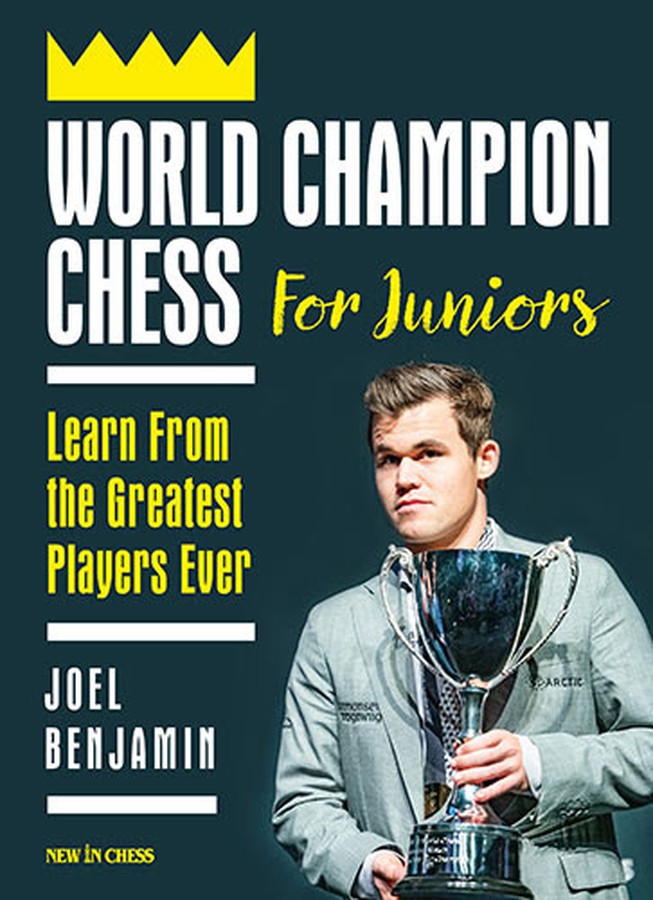| Nivå | B-D |
| Utgivelsesdato | September 2020 |
| Forfatter | |
| Pris | 280 NOK |
World Champion Chess for Juniors
Learn From the Greatest Players EverJoel Benjamin har skrevet en utmerket bok med de beste og mest instruktive partiene av alle verdensmesterne i sjakk, pluss den uoffisielle Paul Morphy. Han vet at mange juniorer idag mangler slik basiskunnskap.
Men det er en bok også for voksne i alle aldere som ønsker en god oversikt over verdensmesternes sjakkhistorie med vekt på selve de "klassiske" sjakkpartiene og hva vi kan lære av dem, som god plattform for dagens ulike inntak av sjakkstoff. Stormester Joel Benjamin er en glimrende kommentator, som selv lærte å spille sjakk som ung gutt akkurat mens Bobby Fischer spilte om VM i 1972.
En glimrende partisamling for alle interesserte - junior eller ikke - med ratingstyrke fra cirka 1000-1100 og oppover.
Forlagets egen omtale:
Grandmaster Joel Benjamin introduces all seventeen World Chess Champions and shows what is important about their style of play and what you can learn from them. He describes both their historical significance and how they inspired his own development as a player.
Benjamin presents the most instructive games of each champion. Magic names such as Kasparov, Capablanca, Alekhine, Botvinnik, Tal, and Karpov, they’re all there, up to current World Champion Magnus Carlsen. How do they open the game? How do they develop their pieces? How do they conduct an attack or defend when necessary? Benjamin explains, in words rather than in chess symbols, what is important for your own improvement.
Two Americans are included in this highly instructive manual, accessible to every post-beginner. Of course the crystal-clear style of Bobby Fischer, the 11th World Champion, guarantees some very memorable lessons. Additionally, Benjamin has included Paul Morphy. The 19th century chess wizard from New Orleans never held an official title, but was clearly the best of the world during his short but dazzling career.
Studying World Champion Chess for Juniors will prove an extremely rewarding experience for ambitious youngsters. Trainers and coaches will find it worthwhile to include the book in their curriculum. The author provides many suggestions for further study.
Joel Benjamin won the US Championship three times and has been a trainer for almost three decades. His book Liquidation on the Chess Board won the Best Book Award of the Chess Journalists of America (CJA), and his most recent book Better Thinking, Better Chess is a world-wide bestseller.
Første del av forordet:
If you are not a junior, please don’t toss this book aside; there is still a lot of cool analysis and history in here for you. But I have written this book, primarily, to reach out to younger players. At any point in history, we see a ‘generation gap’, where young people see the world in a very different way than their elders. If you are, let’s say, a teen or tween, you probably process most chess material from a computer. You follow recent events, work on tactics puzzles, practice against an engine, or whatever works for you. This may match your lifestyle of playing Minecraft or (worse) Fortnite on your I-pad instead of reading books.
A few years ago, I was horrified to learn that two of my (young) fellow instructors at a chess camp could not name the World Champions in order (or even place them roughly in their time periods). For someone of my generation, that fundamental lack of knowledge was unthinkable. And while I accept that kids today learn things in different ways, I feel that they are still missing out from their ignorance of knowledge provided by books.
When I was a boy (back in the Stone Age), chess players read books. Lots of them. We had to of course – we didn’t have other ways to learn. No computers, no Internet, no databases, and, unless you were lucky to live in a chess center (which I did, actually), no access to coaching.
Looking around at the shelves in my office, I realize that the majority of my books date back to my first few years in chess. I have best games collections from most of the World Champions, and several other greats like Nimzowitsch, Rubinstein, Keres, and Larsen. Those pioneers played a big role in forming my understanding of chess.
You may be thinking, ‘Good for you, what does that have to do with us?’ Well, while modern chess tools help us learn things and develop skills faster, they don’t necessarily cover all the bases. We all stand on the shoulders of giants. Players understand the game today because of stuff players figured out back then. If you want to up your game, it’s definitely useful to see chess at its highest level. Today’s grandmasters, as great as they are, play with assistance of computer analysis and knowledge of a ton of opening variations. In a sense, older games have a purity about them. They are rather more mano a mano (which means hand to hand, by the way).
| Innbundet? | Nei |
| Type | Bok |
| Språk | Engelsk |
| Antall sider | 256 |

